Featured Posts

- Index of Psychological Studies of Presidents and Other Leaders Conducted at the Unit for the Study of Personality in Politics
- The Personality Profile of U.S. Supreme Court Associate Justice Brett Kavanaugh
- The Leadership Style of North Korean Leader Kim Jong-un
- North Korea Threat Assessment: The Psychological Profile of Kim Jong-un
- Russia Threat Assessment: Psychological Profile of Vladimir Putin
- The Personality Profile of 2016 Republican Presidential Candidate Donald Trump
- Donald Trump's Narcissism Is Not the Main Issue
- New Website on the Psychology of Politics
- Unit for the Study of Personality in Politics --- 'Media Tipsheet'
categories

- Afghanistan (228)
- Al Gore (2)
- Amy Klobuchar (4)
- Ayman al-Zawahiri (7)
- Barack Obama (60)
- Ben Carson (2)
- Bernie Sanders (7)
- Beto O'Rourke (3)
- Bill Clinton (4)
- Bob Dole (2)
- Campaign log (109)
- Chris Christie (2)
- Chuck Hagel (7)
- Criminal profiles (8)
- Dick Cheney (11)
- Domestic resistance movements (21)
- Donald Trump (31)
- Economy (33)
- Elizabeth Warren (4)
- Environment (24)
- George H. W. Bush (1)
- George W. Bush (21)
- Hillary Clinton (9)
- Immigration (39)
- Iran (43)
- Iraq (258)
- Jeb Bush (3)
- Joe Biden (13)
- John Edwards (2)
- John Kasich (2)
- John Kerry (1)
- John McCain (7)
- Kamala Harris (5)
- Kim Jong-il (3)
- Kim Jong-un (11)
- Law enforcement (25)
- Libya (18)
- Mahmoud Ahmadinejad (6)
- Marco Rubio (2)
- Michael Bloomberg (1)
- Michele Bachmann (173)
- Mike Pence (3)
- Military casualties (234)
- Missing person cases (37)
- Mitt Romney (13)
- Muqtada al-Sadr (10)
- Muslim Brotherhood (6)
- National security (16)
- Nelson Mandela (4)
- News (5)
- North Korea (36)
- Osama bin Laden (19)
- Pakistan (49)
- Personal log (25)
- Pete Buttigieg (4)
- Presidential candidates (19)
- Religious persecution (11)
- Rick Perry (3)
- Rick Santorum (2)
- Robert Mugabe (2)
- Rudy Giuliani (4)
- Russia (7)
- Sarah Palin (7)
- Scott Walker (2)
- Somalia (20)
- Supreme Court (4)
- Syria (5)
- Ted Cruz (4)
- Terrorism (65)
- Tim Pawlenty (8)
- Tom Horner (14)
- Tributes (40)
- Uncategorized (50)
- Vladimir Putin (4)
- Xi Jinping (2)
- Yemen (24)
Links

archives

- November 2021
- January 2021
- November 2020
- October 2020
- September 2020
- August 2020
- July 2020
- April 2020
- March 2020
- February 2020
- January 2020
- December 2019
- October 2019
- July 2019
- May 2019
- April 2019
- March 2019
- February 2019
- January 2019
- December 2018
- September 2018
- August 2018
- July 2018
- June 2018
- April 2018
- March 2018
- February 2018
- January 2018
- August 2017
- July 2017
- June 2017
- May 2017
- April 2017
- February 2017
- January 2017
- December 2016
- November 2016
- October 2016
- September 2016
- August 2016
- July 2016
- June 2016
- May 2016
- April 2016
- March 2016
- February 2016
- January 2016
- December 2015
- November 2015
- October 2015
- September 2015
- August 2015
- July 2015
- June 2015
- May 2015
- April 2015
- March 2015
- February 2015
- January 2015
- December 2014
- November 2014
- October 2014
- September 2014
- August 2014
- July 2014
- June 2014
- May 2014
- April 2014
- March 2014
- February 2014
- January 2014
- December 2013
- November 2013
- October 2013
- September 2013
- August 2013
- July 2013
- June 2013
- May 2013
- April 2013
- March 2013
- February 2013
- January 2013
- December 2012
- November 2012
- October 2012
- September 2012
- August 2012
- July 2012
- June 2012
- May 2012
- April 2012
- March 2012
- February 2012
- January 2012
- December 2011
- November 2011
- October 2011
- September 2011
- August 2011
- July 2011
- June 2011
- May 2011
- April 2011
- March 2011
- February 2011
- January 2011
- December 2010
- November 2010
- October 2010
- September 2010
- August 2010
- July 2010
- June 2010
- May 2010
- April 2010
- March 2010
- February 2010
- January 2010
- December 2009
- November 2009
- October 2009
- September 2009
- August 2009
- July 2009
- June 2009
- May 2009
- April 2009
- March 2009
- February 2009
- January 2009
- December 2008
- November 2008
- October 2008
- September 2008
- August 2008
- July 2008
meta

January 23, 2017 Update
Research papers
The Political Personality of 2016 Republican Presidential Nominee Donald J. Trump. Working paper, Unit for the Study of Personality in Politics, St. John’s University/College of St. Benedict, October 2016. Abstract and link for full-text (31 pages; PDF) download at Digital Commons: http://digitalcommons.csbsju.edu/psychology_pubs/103/
The Leadership Style of U.S. President Donald J. Trump. Working paper, Unit for the Study of Personality in Politics, St. John’s University/College of St. Benedict, January 2017. Abstract and link for full-text (14 pages; PDF) download at Digital Commons: http://digitalcommons.csbsju.edu/psychology_pubs/107/
A psychological analysis of real estate mogul and television celebrity Donald Trump — a contender for the Republican nomination in the 2016 presidential election — by Hannah Hoppe and Aubrey Immelman, Ph.D., at the Unit for the Study of Personality in Politics, revealed that Trump’s predominant personality pattern is Ambitious/self-serving (a measure of narcissism) with secondary features of the Dominant/controlling and Outgoing/gregarious patterns. In summary, Trump’s personality composite can be characterized as a high-dominance charismatic.
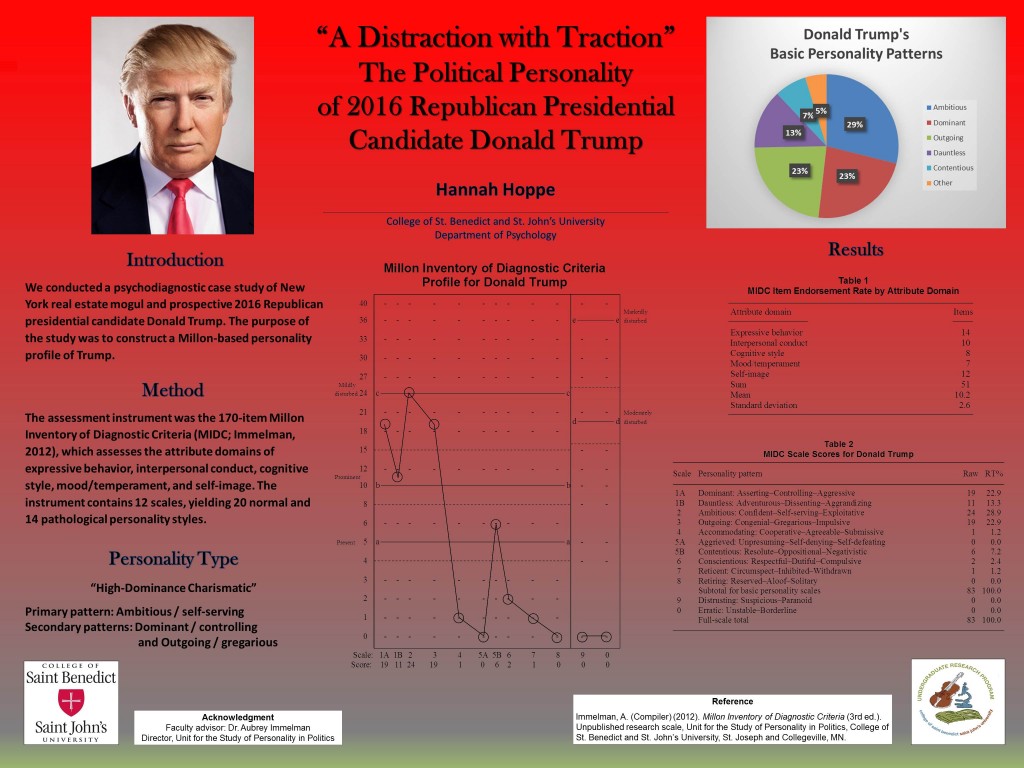
Click on image for larger view
Following is a summary of the major findings of the 2015 study, as published in an opinion column in the St. Cloud Times.
————————————————————————————
Trump Driven by Narcissistic Dreams of Glory

“If we consider Trump’s enduring personality style, it quickly becomes clear why he has emerged as the favorite among the large field of Republican presidential hopefuls.” (Photo: AP)
By Hannah Hoppe
St. Cloud Times
August 9, 2015
A high profile business mogul turned celebrity TV star insults an entire group of people and a nationally recognized war hero, yet expands his lead in the polls in pursuit of the highest office in the land. Anyone not living under a rock knows the candidate in question is Donald Trump — “The Donald.â€
Trump, who is rewriting the conventional wisdom on campaigning for president, announced his run for office in early June, and despite many critics’ cynical prognostications, his campaign is thriving. Recent surveys of Republican voters show Trump with about 25 percent support in a huge field of more than a dozen credible candidates, surpassing even early favorites such as Wisconsin Gov. Scott Walker and former Florida Gov. Jeb Bush.
The question political pundits are asking is this: What makes a man so conspicuously abrasive that popular?
Understanding personality — a person’s ingrained, enduring, predictable patterns of thinking, acting, feeling and relating to others — can go a long way toward answering that question.
Empirical analysis of Trump’s personality employing the Millon Inventory of Diagnostic Criteria was conducted this summer at the College of St. Benedict and St. John’s University’s Unit for the Study of Personality in Politics.
High-dominance charismatic
Trump’s primary personality pattern was found to be Ambitious/self-serving — a measure of narcissism — with secondary features of the Dominant/controlling and Outgoing/gregarious patterns. The label “high-dominance charismatic†serves as shorthand for this particular personality complex, given that political charisma is typically a function of supreme self-confidence (narcissism) in combination with an ample dose of extroversion.
Persons who score high on both the Ambitious and Outgoing scales, as in the case of the self-confident, extroverted Trump — and, incidentally, former president Bill Clinton — are adept at self-promotion and skilled in the art of social influence. Although highly ambitious and driven, they have a tendency to be undisciplined, with a penchant for thinking superficially and speaking in generalities. They are prone to act impulsively and ultimately are more attuned to their own needs than to those of others.
The high level of dominance (indicative of combativeness) in Trump’s personality profile also yields some interesting insights. High dominance in a candidate feeds the public perception of strong leadership, an important component of electability. That holds especially true in the Republican Party, which tends to value toughness — a strong military, law and order, and so on — to a higher degree than is the case in the Democratic Party.
Leadership implications
Examining Trump’s particular blend of personality traits paints a clearer picture of the persona behind the “distraction with traction,†as the Des Moines Register characterized the insurgent Trump in a recent editorial.
Not surprisingly, Trump’s personality has predictable leadership implications. He is exactly the kind of person who would pay actors to attend his presidential announcement speech as has been alleged, speaks in broad, oftentimes exaggerated, terms like saying he has a secret plan to defeat the Islamic State, refuses to apologize for anything, views himself as a nice guy loved by everyone, is driven by narcissistic dreams of glory, and considers himself potentially one of the greatest presidents in the history of the United States.
If we consider Trump’s enduring personality style, it quickly becomes clear why he has emerged as the favorite among the large field of Republican presidential hopefuls. Although name recognition surely plays a part, Trump is flying high by dint of his dramatizing, self-assured, self-inflating tone and a compelling, captivating persona, which sucks the air from media coverage of his rivals and places him center stage in water-cooler and dinner-table talk from coast to coast.
Of course, whether these personal attributes make for effective leadership of the free world is an open question.
This is the opinion of Hannah Hoppe, St. Cloud, a senior psychology major at the College of St. Benedict and St. John’s University, where she is a summer research fellow in the Unit for the Study of Personality in Politics, directed by Aubrey Immelman.

Hannah Hoppe, St. Cloud (Submitted photo)
About this series
This is the third in an occasional series of personality profiles of most of the Republican candidates in the 2016 presidential election. Hannah Hoppe is a research assistant at the Unit for the Study of Personality in Politics led by associate professor Aubrey Immelman at St. John’s University/College of St. Benedict. Immelman specializes in the psychological assessment of presidential candidates and world leaders.
The unit’s summer research program focused on GOP contenders because of the unprecedented proliferation of hopefuls and the unit’s mission to help the public make better informed voting choices. The unit will profile the major Democratic contenders next summer.
—————————————————————————————
Update: Trump research presented at NCUR
Hannah Hoppe presented her research poster “Personality Profiling of 2016 GOP Presidential Candidates: The Case of Donald Trump” at NCUR 2016, the 30th Anniversary National Conference on Undergraduate Research at the University of North Carolina at Asheville, April 7-9, 2016.
Abstract
Personality Profiling of 2016 GOP Presidential Candidates:
The Case of Donald Trump
The poster presents the results of an indirect assessment of the personality of Donald J. Trump, Republican presidential contender in the 2016 U.S. presidential election.
The study was conducted from the conceptual perspective of personologist Theodore Millon. Diagnostic information concerning Trump was collected from biographical sources and media reports and synthesized into a personality profile using the Millon Inventory of Diagnostic Criteria (MIDC), which taps the attribute domains of expressive behavior, interpersonal conduct, cognitive style, mood/temperament, and self-image, yielding 34 normal and maladaptive personality classifications congruent with Axis II of DSM–IV.
The personality profile yielded by the MIDC was analyzed on the basis of interpretive guidelines provided in the MIDC and Millon Index of Personality Styles manuals.
Trump’s personality pattern was found to be Ambitious/self-serving (a measure of narcissism), Dominant/controlling, and Outgoing/gregarious. The label high-dominance charismatic serves as shorthand for this particular personality composite, given that political charisma typically is a function of supreme self-confidence in combination with high-energy extraversion and social dominance.
Leaders who score high on both the Ambitious and Outgoing scales are adept at self-promotion and skilled in the art of social influence. Although highly ambitious and driven, they have a tendency to be undisciplined, with a penchant for thinking superficially and speaking in generalities. They are prone to act impulsively and ultimately are more attuned to their own needs than to those of others.
Leaders who score high on the Dominant scale are tough and combative, and are perceived as strong leaders – an important aspect of electability.
The major implication of the study is that it offers an empirically based personological framework for identifying – and direct comparison of his election rivals – Trump’s major strengths and limitations as a candidate and anticipating his likely leadership style as president.
————————————————————————————————————
Donald Trump i udhëhequr nga ëndrrat narcistike për lavdi
Albanian translation, by Fidan Kalaja, of “Trump driven by narcissistic dreams of glory” published Oct. 26, 2015 in S’BUNKER, an online platform for analysis, commentary, and creative outreach on social issues and public policy in Kosovo
———————————————————————————————————
Note: Personal Electability Index (political impact) score
Donald Trump scores extraordinarily high on the Millon Inventory of Diagnostic Criteria-based Personal Electability Index, which has accurately predicted the outcome of every presidential election since 1996.
Following are the PEI calculations for Donald Trump:
Donald Trump: PEI = 62
Scale:Â Â Â 1AÂ Â Â 1BÂ Â Â 2Â Â Â 3Â Â Â 4Â Â Â 5AÂ Â Â 5BÂ Â Â 6Â Â Â 7Â Â Â 8
Score: Â Â 19Â Â 11Â Â 24Â 19Â Â Â 1Â Â Â Â Â 0Â Â Â Â Â 6Â Â Â Â 2Â Â Â 1Â Â 0
Scale: 1A = 19; 2 = 24; 3 = 19; 6 = 2; 8 = 0
[Extraversion (scale 3) = 19] + [Narcissism (scale 2) = 24] + [Dominance (scale 1A) = 19] – [Introversion (scale 8) = 0] – [Conscientiousness (scale 6) = (2 – 2) = 0] = 62 – 0 = 62
Dysfunctionality adjusted
[Extraversion (scale 3) = 15] + [Narcissism (scale 2) = 15] + [Dominance (scale 1A) = 15] – [Introversion (scale 8) = 0] – [Conscientiousness (scale 6) = (2 – 2) = 0] = 45 – 0 = 45
July 2016 Update
Donald Trump: PEI = 65
Scale:Â Â Â 1AÂ Â Â 1BÂ Â Â 2Â Â Â 3Â Â Â 4Â Â Â 5AÂ Â Â 5BÂ Â Â 6Â Â Â 7Â Â Â 8
Score: Â Â 17Â Â Â 9Â Â 24Â 24 Â 0 Â Â Â Â 0Â Â Â Â Â 4Â Â Â Â 0 Â Â 0Â Â 0
Scale: 1A = 17; 2 = 24; 3 = 24; 6 = 0; 8 = 0
[Extraversion (scale 3) = 24] + [Narcissism (scale 2) = 24] + [Dominance (scale 1A) = 17] – [Introversion (scale 8) = 0] – [Conscientiousness (scale 6) = (2 – 2) = 0] = 62 – 0 = 62
Dysfunctionality adjusted
[Extraversion (scale 3) = 15] + [Narcissism (scale 2) = 15] + [Dominance (scale 1A) = 15] – [Introversion (scale 8) = 0] – [Conscientiousness (scale 6) = (0 – 0) = 0] = 45 – 0 = 45
Update: July 2016 Replication/Validity Study
A follow-up replication study of Republican presidential candidate Donald Trump by Anna Faerber and Aubrey Immelman, Ph.D., at the Unit for the Study of Personality in Politics, revealed that Trump’s predominant personality patterns are Ambitious/exploitative (a measure of narcissism) and Outgoing/impulsive, infused with secondary features of the Dominant/controlling pattern, and supplemented by Dauntless/ adventurous and Contentious/resolute tendencies. These findings do not differ significantly from those of the original summer 2015 study. The replication study confirms that Trump’s personality composite is best characterized as a high-dominance charismatic — charismatic by virtue of the highly elevated primary Ambitious-Outgoing amalgam.
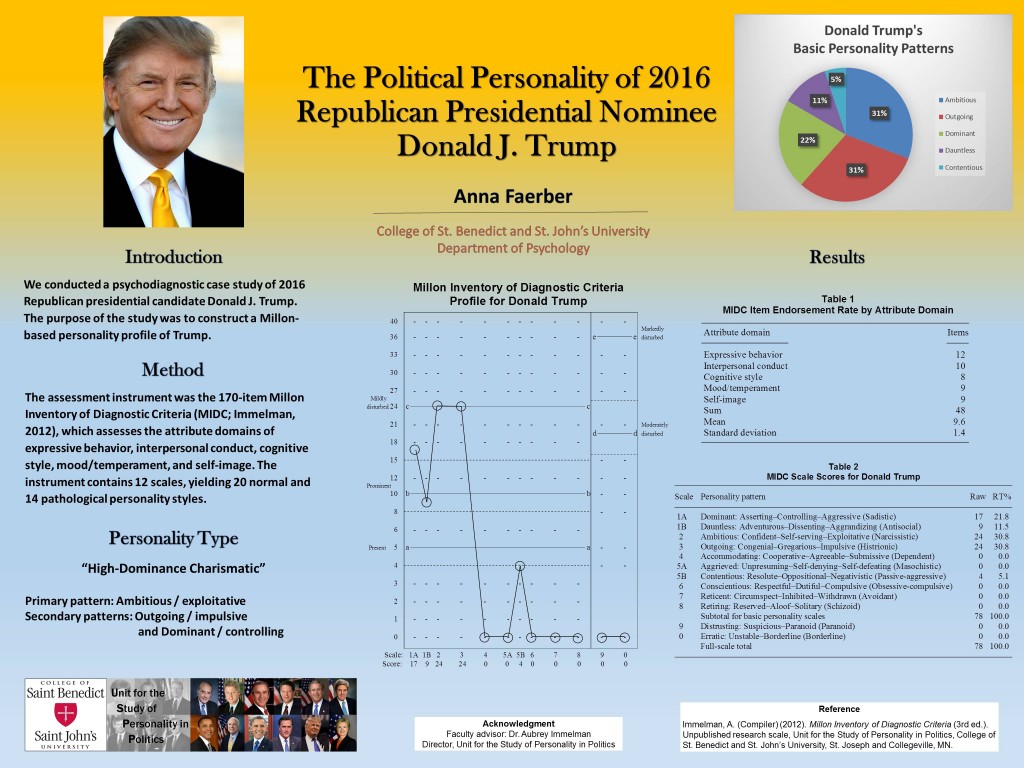
Click on image for larger view
Following is a summary of the major findings of the 2016 study, as published in an opinion column in the St. Cloud Times.
—————————————————————————————
Trump’s Personality Could Win, Except …

Anna Faerber (Submitted photo)
By Anna Faerber
St. Cloud Times
August 21, 2016
Gerald Ford has been called “the accidental president.†Similarly, a fitting moniker for Donald Trump might be “the unlikely nominee.â€
How could the man no one thought would make it through the primaries clinch his party’s nomination for the highest office in the land?
When “The Donald†dramatically descended the Trump Tower escalator in New York last June to announce his candidacy for president, pundits treated him as a mere curiosity who wouldn’t make it through the first few GOP debates, let alone clinch the nomination. So, one is left to wonder: What is it about this rank political amateur that enabled him to rise above a throng of more credible, experienced rivals?
To answer that question, a team of investigators at the Unit for the Study of Personality in Politics at the College of St. Benedict and St. John’s University embarked on a project to develop a psychological analysis of Trump, publishing their initial results in the Times one year ago. (“Trump driven by narcissistic dreams of glory,†Aug. 9, 2015).
This summer, we conducted a followup study, again using our locally developed instrument, the Millon Inventory of Diagnostic Criteria. It confirmed last summer’s findings.
High-dominance charismatic
We can report with a high degree of confidence that Trump’s primary personality patterns are ambitious/exploitative (a measure of narcissism), and outgoing/impulsive (a measure of extraversion). Secondarily, Trump exhibits a dominant/controlling pattern, supplemented by dauntless/adventurous and contentious/resolute tendencies — a personality composite best labeled a “high-dominance charismatic.â€
People who score high on both the ambitious and outgoing MIDC scales, such as Trump — and before him former President Bill Clinton — are extraordinarily self-confident and gregarious.
They are adept at self-promotion and social influence and are noted for their high ambition, relentless drive and boundless energy. However, they tend to be undisciplined and are prone to scattered or superficial thinking and thoughtless judgments, tending to act impulsively without carefully considering the consequences and driven more by personal self-interest than by altruism or the larger public interest.
Strong leader or bully?
Trump’s personality profile also includes a high level of dominance, which accounts for his chronic combativeness, seeming inability to resist personal attacks, and a tendency to go off-script, often at the expense of his political viability.
Dominance in a candidate is a positive personality trait when properly managed. Voters view it as an indicator of strong leadership, which is particularly appealing to conservatives, though less so to liberals. Republicans place a higher premium on toughness than do Democrats, favoring a muscular military, maintaining law and order, beefing up border security, and so on.
But excessive dominance could hamstring Trump in the general presidential campaign. To expand his appeal to moderates, independents and women Trump will have to soften his image.
Surprising at polls
Donald Trump: President of the United States is not a title many people would have associated with the reality television star of a little more than one year ago. And yet his sagging poll numbers notwithstanding, there remains a distinct possibility Trump could add that very title to his conquests.
From the perspective of the psychology of politics, the secret to Trump’s success is his combination of self-confident narcissism, engaging extraversion and commanding dominance, unfiltered by even a hint of conscientiousness — which makes a candidate appear stiff and formal (think Al Gore) — or introversion, which renders a candidate aloof and secretive (think Richard Nixon) in the public mind.
Trump is not the only candidate to have perplexed pundits at the polls in recent political history by some combination of narcissistic, outgoing and dominant personality traits, foremost among them Bill Clinton and George W. Bush — two men who share key characteristics with Trump.
The highly extraverted, narcissistic Clinton most closely resembles Trump, though he lacks Trump’s aggressive dominance. Bush, in turn resembles Trump in terms of dominance and extraversion, but unlike Trump, is not a narcissist.
Trump shares Clinton’s burning ambition and sociability and Bush’s toughness and extraversion — though surpassing them on all counts.
Trump’s to lose
Since the advent of televised presidential debates more than 50 years ago, extraversion, narcissism and dominance have been highly predictive of electoral success, especially the Clintonian outgoing-narcissist mix, which yields political charisma.
Given Trump’s bounty of beneficial personality traits, which stand in stark contrast to the less favorable personal qualities of his Democratic rival, and given today’s political climate, which appears primed for change, the 2016 presidential race is Trump’s to lose.
Unfortunately for Trump, that’s exactly what he’s doing, with a lethal combination of sparse political experience and a level of impulsiveness that renders it a near-impossibility for him to run a winning presidential campaign.
This is the opinion of Anna Faerber, St. Cloud, a first-year psychology major at the College of St. Benedict and St. John’s University, where she is a summer research fellow in the Unit for the Study of Personality in Politics, directed by Aubrey Immelman.
About this series
This is the ninth in an occasional series of personality profiles of candidates in the 2016 presidential election. Anna Faerber is a research assistant in the Unit for the Study of Personality in Politics led by associate professor Aubrey Immelman at St. John’s University/College of St. Benedict. Immelman specializes in the psychological assessment of presidential candidates and world leaders. A similar commentary about Hillary Clinton is planned for Aug. 28.
Detailed Psychological Assessments Released (Nov. 4, 2016)
The Unit for the Study of Personality in Politics has released political-psychological assessments of Donald Trump and Hillary Clinton.
Executive Summary: Donald J. Trump
Full text (31 pages)
The Political Personality of 2016 Republican Presidential Nominee Donald J. Trump (Working paper, Unit for the Study of Personality in Politics, St. John’s University/College of St. Benedict, October 2016)
Executive Summary: Hillary Clinton
Full text (34 pages)
The Political Personality of 2016 Democratic Presidential Nominee Hillary Clinton (Working paper, Unit for the Study of Personality in Politics, St. John’s University/College of St. Benedict, October 2016)
Comparison of Hillary Clinton’s and Donald Trump’s Profiles
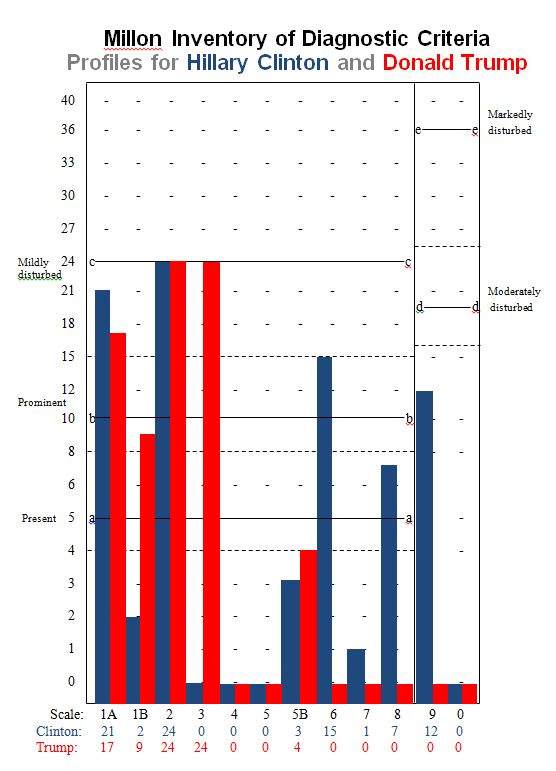
Related reports on this site
Donald Trump’s Leadership Style (Jan. 23, 2017)
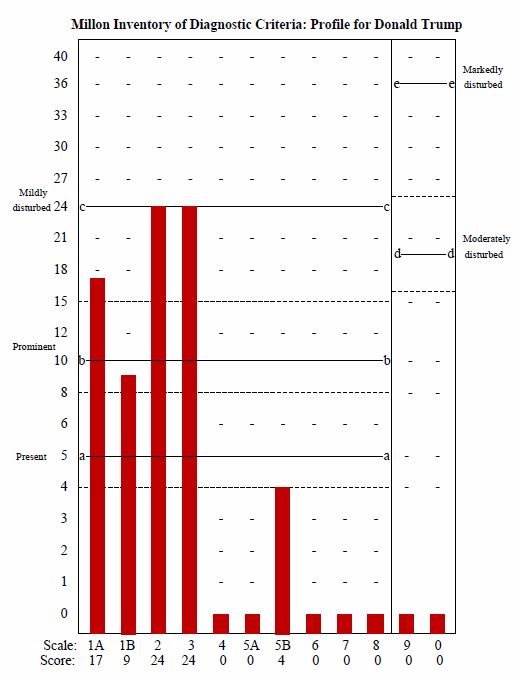
Donald Trump’s Temperament: Trump’s Fitness to be President (Oct. 5, 2016)
Donald Trump’s Narcissism Is Not the Main Issue (Aug. 11, 2016)
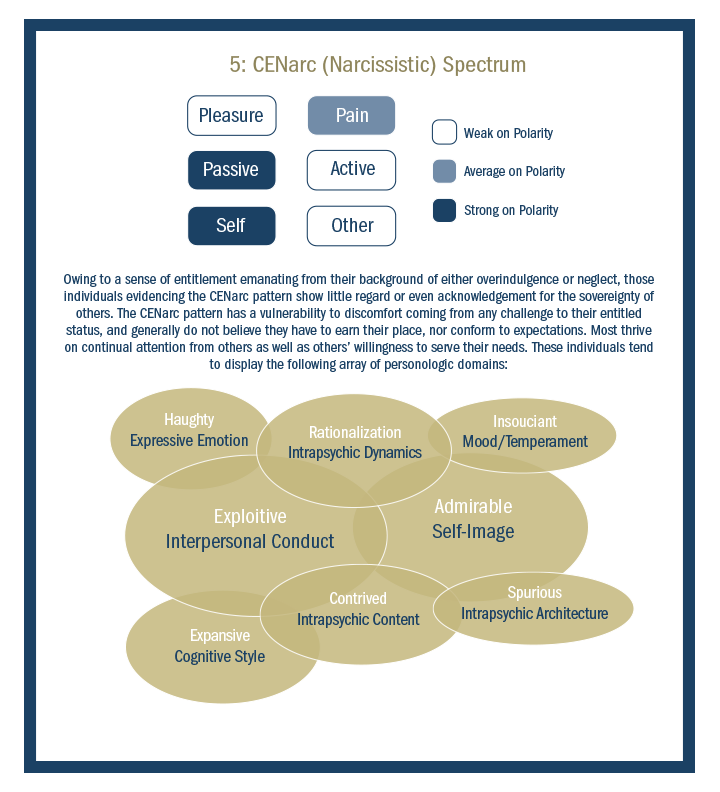
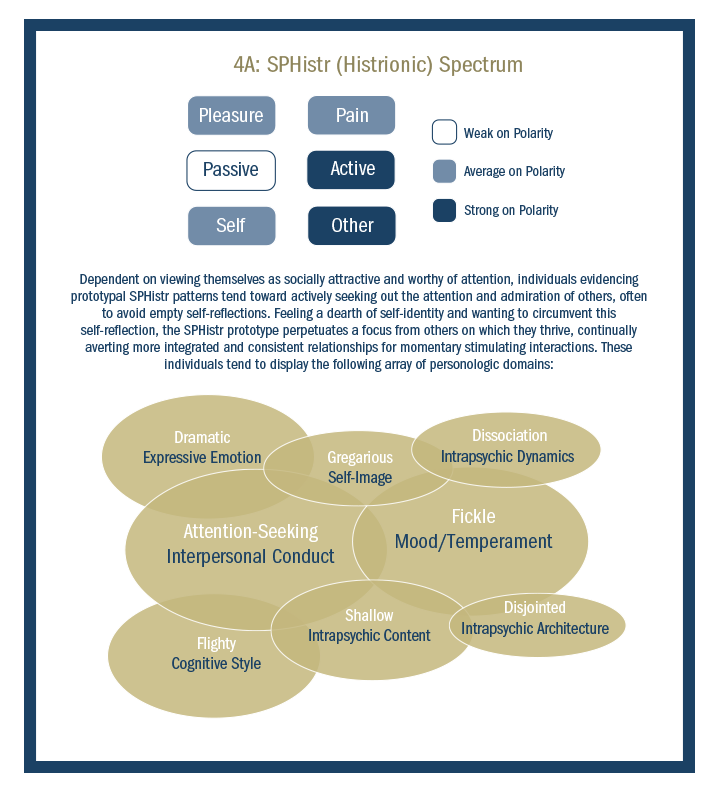
© 2015 MILLON®                                          (Click on images for larger view)
The Personality Profile of 2016 Democratic Presidential Candidate Hillary Clinton (July 27, 2016)
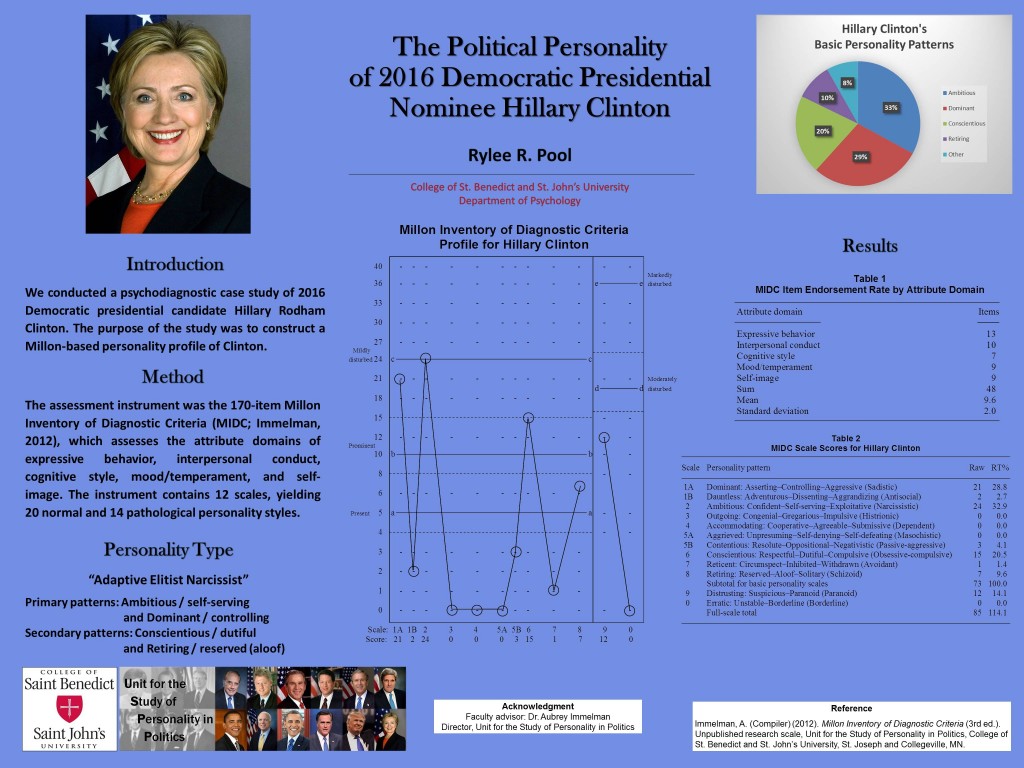
Click on image for larger view
Projecting the Winner of the 2016 Presidential Election: The Personal Electability Index (Feb. 29, 2016)
Why Donald Trump Beats Jeb Bush: The Personal Electability Index (Aug. 23, 2015)
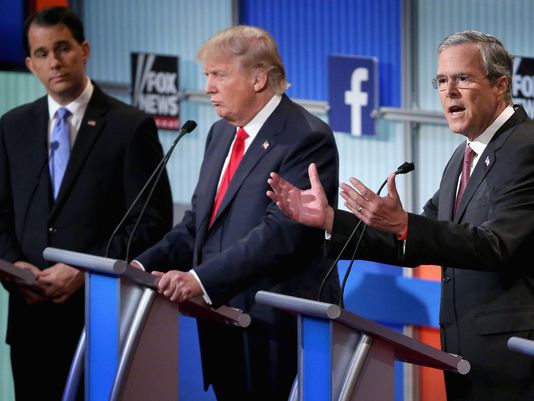
Photo credit: Chip Somodevilla / Getty Images
Comparative Psychological Profiles of the GOP Field (Aug. 6, 2015)
Republican Presidential Candidate Profiles, Polling, and Debates (May 31, 2015)








Republican presidential contenders (from left to right and top to bottom) Ben Carson, Ted Cruz, Carly Fiorina, Mike Huckabee, George Pataki, Rand Paul, Marco Rubio, and Rick Santorum (Photo credits: Gage Skidmore, officeholder official portraits / Wikipedia)
Related reports
—————————
What Explains Donald Trump’s Arrogance?

By David Gergen
CNN Senior Political Analyst
![]()
August 10, 2015
Excerpts
Donald Trump’s behavior on stage Thursday night and in the days that have followed strike many as unfathomable: How can anyone act so arrogantly and meanly in public life? But in fact, there is a large body of academic and other work that helps to explain. Just Google the literature on “narcissistic leadership” and you will instantly recognize Trump — both his bright and dark sides.
[ . . . ]
A century ago, Sigmund Freud famously identified three basic personality types: erotics (those who love and need to be loved), obsessives (more inner-directed), and narcissists (those fixated with themselves and who crave adoration, not love).
More recently, Michael Maccoby, a psychoanalyst and anthropologist who has counseled governments and corporations for decades, has written the most accessible and popular work on narcissistic leaders. In my view, his article in the Harvard Business Review in 2004 remains the best short essay on the subject in the past several years.
Maccoby recognizes that Freud’s three types overlap in many of us and that all of us have a degree of narcissism. Self-esteem helps us survive and meet our basic needs in life. Maccoby goes on to argue that in turbulent, uncertain times, societies actually need narcissistic leaders. They tend to be strong people like Trump with large vision, lots of charisma, oratorical magnetism and a powerful drive to get results. They are less concerned with dangers in the future than with transforming it.
He calls these “productive narcissists” and includes among their ranks Mahatma Gandhi, Winston Churchill and Franklin Roosevelt, as well as recent corporate leaders like Jack Welch, Bill Gates and Steve Jobs. (He doesn’t name but presumably would include Eleanor Roosevelt, Indira Gandhi and Golda Meir.)
But there are traps for “productive narcissists” — and here’s where the Trump saga gets interesting. As narcissistic leaders experience one success after another, they face a danger of believing more and more in their own infallibility and less in the judgment of others.
[ . . . ]
Freud argues, and Maccoby agrees, that narcissistic leaders can become increasingly isolated and distrustful of others. They develop thin skin and lash out when questioned. Apple co-founder Steve Jobs, for all his brilliance, publicly humiliated his subordinates. In more extreme cases, they become relentless and ruthless; their response to critics turns into apparent vengeance. Sound familiar?
[ . . . ]
David Gergen is a senior political analyst for CNN and has been a White House adviser to four presidents. A graduate of Harvard Law School, he is a professor of public service and co-director of the Center for Public Leadership at The Harvard Kennedy School.
————————————————————
Trump on the journalist’s couch
The Truth About Donald Trump’s Narcissism (Jeffrey Kluger, Time, Aug. 11, 2015) — The problem with being Trump is the same thing that explains the enormous fame and success of Trump: a naked neediness, a certain shamelessness, an insatiable hunger to be the largest, loudest, most honkingly conspicuous presence in any room. … To call Donald Trump a narcissist is, of course, to state the clinically obvious. There is the egotism of narcissism, the grandiosity of narcissism, the social obtuseness of narcissism. … Their act becomes old, their opponents become bold, and the audience—inevitably—moves onto something else. Trump the phenomenon will surely become Trump the afterthought. He is a man who desperately hungers for respect and attention and who, by dint of that very desperation, will likely wind up with neither. … Full report
The Junk Politics of 2015 (Timothy Egan, New York Times, Aug. 14, 2015) — Normal politics can’t explain Trump. For that you need Freud. Trump fits the classic definition of narcissistic personality disorder. … Full report
—————————————————————————————————————
Bobby Jindal: Donald Trump is a “narcissist,” “egomaniac”
![]() Video
Video
——————————————————————————————————————
Dr. Drew Pinsky: Trump May Be Mentally Ill
![]() Video » Dr. Drew talks Trump (“CNN Tonight,†Aug. 1, 2016) — Dr. Drew Pinsky tells Don Lemon that Donald Trump does not fit the stringent legal definition for insanity — but he does show signs of multiple mental illnesses. (6:46)
Video » Dr. Drew talks Trump (“CNN Tonight,†Aug. 1, 2016) — Dr. Drew Pinsky tells Don Lemon that Donald Trump does not fit the stringent legal definition for insanity — but he does show signs of multiple mental illnesses. (6:46)
By Travis Gettys
The Raw Story
August 2, 2016
Excerpts
[Dr. Drew Pinsky] … appeared Monday night on CNN, where he told Don Lemon … that Trump did not fit either the legal or clinical definition of insane, and then he discussed the candidate’s apparent narcissism.
“People want to label him with a narcissistic personality disorder, and that is a pretty tough, tough thing to do at a distance,†Pinsky said. “But let me just talk to you, narcissism generally can be a good thing. If you’re a fighter pilot, we want you to be narcissist, not to have fear in extreme circumstances. Most political leaders have some degree of narcissism, what motivates them to go into these areas. We’ve done research on this, (and) it bears that out.â€
Pinsky disagreed with HBO host John Oliver’s assessment that Trump was a sociopath, saying the real estate developer and reality TV host appeared to maintain close relationships with his children.
“It is unfair because sociopaths are usually tied up with really, serious problems with criminal behavior, but, you know, you can be manipulative, can be narcissistic and still do okay in life,†Pinsky said. “But, again, your relationships usually have extreme pathology. (It’s) very difficult to raise healthy kids, very difficult to have sustained marriages if you’re deep into narcissism.â€
However, he said Trump showed enough troubling signs of mental instability to raise concerns about his fitness for office.
“The question, though, is, are some of the reckless qualities that everyone is getting so disturbed about on the campaign going to be translated into office should he get elected?†Pinsky said. “That’s a pretty hard thing to predict. I don’t know if this is just somebody playing politics, or is this somebody who really can’t contain their impulses?â€
Pinsky wondered if Trump might show signs of bipolar disorder, which is characterized by unusual shifts in mood, energy and activity levels, along with an inability to carry out daily functions.
“When I hear people that are impulsive with their speech, I worry about hypomania and bipolar types of conditions,†Pinsky said. “As he says, he has boundless energy. Again, a little hypomania can be great. There are a lot of hypomanic businessmen that get a ton done. Containing your speech, be thoughtful, take a beat before you say something, for those people it can be very, very difficult.†…
“Let’s just assume that most people that would choose to be in a very high-profile race like this would have narcissistic tendencies, and there’s something called sort of narcissistic injury, then narcissistic rage,†Pinsky said. “If you injure — if you really shame somebody — they tend to be sort of teflon when it comes to shame. If you shame them, they can react with extreme aggression and extreme rage. So this seems to be that kind of a psychological process.†…
——————————————————————————————————————
‘Dr.’ Lawrence O’Donnell diagnoses Donald Trump with narcissistic personality disorder on MSNBC
![]() Video » Trump: the candidate ‘unfit to serve?’ (MSNBC “The Last Word,†Aug. 2, 2016) — Pres. Obama blasted Donald Trump, calling the GOP nominee ‘unfit to serve’ as president. Lawrence O’Donnell speaks with George Simon, E.J. Dionne, and Mark Singer about Trump’s temperament, rhetoric, and personality challenges. (18:20)
Video » Trump: the candidate ‘unfit to serve?’ (MSNBC “The Last Word,†Aug. 2, 2016) — Pres. Obama blasted Donald Trump, calling the GOP nominee ‘unfit to serve’ as president. Lawrence O’Donnell speaks with George Simon, E.J. Dionne, and Mark Singer about Trump’s temperament, rhetoric, and personality challenges. (18:20)
——————
Updates
——————
10/25/2015
——————
12/6/2015
95,000 Words, Many of Them Ominous, from Donald Trump
By Patrick Healey and Maggie Haberman

December 6, 2015
Excerpts
The New York Times analyzed every public utterance by Mr. Trump over the past week from rallies, speeches, interviews and news conferences to explore the leading candidate’s hold on the Republican electorate for the past five months. The transcriptions yielded 95,000 words and several powerful patterns, demonstrating how Mr. Trump has built one of the most surprising political movements in decades and, historians say, echoing the appeals of some demagogues of the past century. …
A significant difference between Mr. Trump and 20th-century American demagogues is that many of them, especially McCarthy and Wallace, were charmless public speakers. Mr. Trump, by contrast, is an energetic and charismatic speaker who can be entertaining and ingratiating with his audiences. There is a looseness to his language that sounds almost like water-cooler talk or neighborly banter, regardless of what it is about. …
Mr. Trump has said he will tear into anyone who tries to take him on, and he presents himself as someone who is always right in his opinions — even prophetic, a visionary. …
Full report and video at the New York Times
———————
12/9/2015
Nothing’s Gonna Stop Him Now: Why The GOP Can’t Derail Donald Trump (Lauren Fox, Talking Points Memo, Dec. 9, 2015) — With just two months until the Iowa caucuses, it may be time to recognize the reality that the myth has been obscuring: No strategic intervention is going to stop Trump now. “If anyone is going to kill Trump, it is Trump,” said Allan Lichtman, a history professor at American University and the author of White Protestant Nation: The Rise of the American Conservative Movement. … Full report
———————
12/11/2015
It’s Not Chaos. It’s Trump’s Campaign Strategy.
By Paul Schwartzman and Jenna Johnson
![]()
December 9, 2015
Excerpts
He referred to Mexicans as “rapists,†questioned Sen. John McCain’s status as a war hero, ridiculed the physical appearance of his opponents, falsely claimed that “thousands†in New Jersey cheered as the World Trade Center fell and, this week, called for a ban on Muslims entering the United States.
Despite predictions that such searing, divisive rhetoric and the resulting outcry would cripple his campaign, Donald Trump’s insults and controversial proposals have propelled him to the forefront of the 2016 presidential race — and kept him there.
And while it may seem like a lurching, chaotic campaign, Trump is, for the most part, a disciplined and methodical candidate, according to a Washington Post review of the businessman’s speeches, interviews and thousands of tweets and retweets over the past six months. …
The Post’s analysis found several qualities to Trump’s approach. First is a pattern of experimentation that suggests that he is testing his insults and attacks as he goes along. Like a team of corporate marketers, Trump understands the value of message-testing — but he appears to do it spontaneously, behind the lectern and on live television. …
Another quality to Trump’s words is the kernel of truth that often exists in even his most inflammatory statements. …
These patterns of speaking, along with his charm and sometimes lavish praise for people he likes, resonate with many conservative voters who are looking for someone to trust over the mainstream media. They see Trump as genuine and honest, one of the few politicians who don’t lie to them, even if his comments are not fully true.
With each new uproar, the analysis also showed, a largely predictable cycle unfolds. It begins with Trump’s bombast. Next comes condemnation and predictions that his candidacy is doomed, followed by his tendency to keep going without backing down. The pattern has repeated with many of his major controversies.
Trump often provokes a fresh, whiplash-inducing controversy that eclipses the current one, triggering a new round of free media coverage that cements his place at the forefront of the news cycle. …
At other moments, Trump repeats his inaccuracies with escalating zeal even as they are debunked by experts. …
For all his apparent ad-libbing, Trump’s presentation is rife with words he often repeats. He tells supporters that the wall he wants to build on the southern border would be the “greatest.†The purported mastermind who terrorized Paris was a “moron†in a “filthy, dirty hat.â€
He is no more predictable than when he disparages his Republican opponents, using his outsize platform to define them in highly personal and unflattering terms. …
Full report and multimedia at the Washington Post
———————
12/28/2015
Trump Ties with Pope Francis in U.S. Poll for Second Most-Admired Man in the World (Nick Gass, Politico, Dec. 28, 2015) – Americans named Hillary Clinton and President Barack Obama as their most admired woman and man in the world in 2015, with Donald Trump earning the same share of admiration as Pope Francis, according to the results of the latest Gallup survey. … On the list of most admired men, Pope Francis and Republican presidential candidate Donald Trump tied for second place with 5 percent each. … Full report
——————
1/5/2016
Donald Trump’s strongest supporters: A certain kind of Democrat (Nate Cohn, New York Times, Dec. 31, 2015) – Perhaps above all else, the data shows that Mr. Trump has broad support in the G.O.P., spanning all major demographic groups. He leads among Republican women and among people in well-educated and affluent areas. He even holds a nominal lead among Republican respondents that Civis estimated are Hispanic, based on their names and where they live. … Full report
———————
2/10/2016
Questionable Journalism As News Media Editorialize on Trump New Hampshire Victory
As reported by CNN:
Huffington Post took a visceral and aggressive approach to Donald Trump’s victory in New Hampshire on Tuesday night, blasting the GOP front-runner as a “racist, sexist demagogue.”
The headline on the homepage, in bold, red, 72-point font, reads: “NH GOES RACIST SEXIST XENOPHOBIC.” The headline on the story: “A Racist, Sexist Demagogue Just Won The New Hampshire Primary.”
The story, essentially an indictment of New Hampshire voters for choosing Trump, is in keeping with an editorial stance the website has had for weeks. …
Huffington Post wasn’t the only media organization to indict New Hampshire voters. The New York Daily News, long an outspoken critic of Trump, revealed that Wednesday’s headline will be: “DAWN OF THE BRAIN DEAD: Trump comes back to life with N.H. win as mindless zombies turn out in droves.”
The controversial New York Daily News front page of Feb. 10, 2016.
(Click on image for larger view)
——————
3/6/2016
Minnesota’s GOP Leaders Rattled as Trump’s Support Grows
By Patrick Condon
![]()
March 6, 2016
Excerpts
Republicans at the Minnesota caucuses handed [Donald] Trump his only third-place finish, living up to the state’s history of going its own way politically. Unfortunately for the Republicans who voted for Sens. Marco Rubio of Florida or Ted Cruz of Texas, they still stand a good chance of getting stuck with Trump. …
As Trump racks up wins across the country, his success threatens to unravel the GOP. Some of his GOP critics want a brokered convention to block him. But that maneuver would alienate millions of Trump’s supporters, many of whom have little allegiance to the party. …
Mark Drake, who previously worked for [former Gov. Tim] Pawlenty, former Sen. Norm Coleman and the GOP locally and nationally, cited a number of Trump’s more outrageous plans or actions for why many in the GOP are so uneasy: His call for a ban on all Muslims entering the U.S.; his ridicule of Sen. John McCain for having been a POW; his initial refusal to denounce white supremacist David Duke and the Ku Klux Klan. …
Why the disdain for Trump? [Charlie Weaver, a business lobbyist and onetime top aide to former Gov. Tim Pawlenty] … called him “a self-centered bully.†Coleman called him a fraud, a misogynist, and frightening. Former U.S. Rep. Vin Weber, a powerful Washington lobbyist, called Trump’s proposed ban on Muslim immigrants “deeply, morally offensive.†…
———————
3/20/2016
Republican Leaders Map a Strategy to Derail Donald Trump
By Alexander Burns and Jonathan Martin

March 19, 2016
Excerpts
Republican leaders adamantly opposed to Donald J. Trump’s candidacy are preparing a 100-day campaign to deny him the presidential nomination, starting with an aggressive battle in Wisconsin’s April 5 primary and extending into the summer, with a delegate-by-delegate lobbying effort that would cast Mr. Trump as a calamitous choice for the general election.
Recognizing that Mr. Trump has seized a formidable advantage in the race, they say that an effort to block him would rely on an array of desperation measures, the political equivalent of guerrilla fighting.
There is no longer room for error or delay, the anti-Trump forces say, and without a flawlessly executed plan of attack, he could well become unstoppable.
But should that effort falter, leading conservatives are prepared to field an independent candidate in the general election, to defend Republican principles and offer traditional conservatives an alternative to Mr. Trump’s hard-edged populism. They described their plans in interviews after Mr. Trump’s victories last Tuesday in Florida and three other states. …
William Kristol [link added], editor of The Weekly Standard, has circulated a memo to a small number of conservative allies detailing the process by which an independent candidate could get on general-election ballots across the country.
Among the recruits under discussion are Tom Coburn, a former Oklahoma senator who has told associates that he would be open to running, and Rick Perry [link added], the former Texas governor who was suggested as a possible third-party candidate at a meeting of conservative activists on Thursday in Washington. …
Trump opponents convened a series of war councils last week to pinpoint his biggest vulnerabilities and consider whether to endorse one of his two remaining opponents, Senator Ted Cruz [link added] of Texas and Gov. John Kasich [link added] of Ohio. …
For Republicans opposed to Mr. Trump under any circumstances, a third-party campaign offers a last refuge. Such a candidacy might gain support from high levels of the party: [Mitt] Romney [link added] has said he would be inclined to vote for a third candidate over Mr. Trump and Hillary Clinton. …
[Bill] Kristol [link added], a leading critic of Mr. Trump, said in an interview that he believed it was not too late to put forward a viable independent candidacy. “I think the ballot access question is manageable,†he said. “The big question is, who’s the candidate?†…
A version of this article appears in print on March 20, 2016, on page A1 of the New York edition with the headline: Facing Long Odds, G.O.P. Leaders Map Strategy to Derail Trump.
Read the full report at the New York Times
———————
3/28/2016
An Open Letter to Trump Voters from His Top Strategist-Turned-Defector

By Stephanie Cegielski
March 28, 2016
Excerpts from letter that speaks to Donald Trump’s character
Even Trump’s most trusted advisors didn’t expect him to fare this well.
Almost a year ago, recruited for my public relations and public policy expertise, I sat in Trump Tower being told that the goal was to get The Donald to poll in double digits and come in second in delegate count. That was it.
The Trump camp would have been satisfied to see him polling at 12% and taking second place to a candidate who might hold 50%. His candidacy was a protest candidacy. …
Trump never intended to be the candidate. But his pride is too out of control to stop him now. …
The hard truth is: Trump only cares about Trump. …
Read the entire open letter at xoJane.com
————————————————
5/26/2016 Breaking News
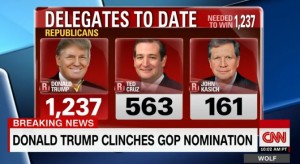
Click on image for larger view
——————
7/14/2016
For Trump, It’s About America’s Ego — And His Own

In this May 24, 2007, file photo, Donald Trump is profiled against his 92-story Trump International Hotel & Tower during a news conference on construction progress in Chicago. (Photo:Â Charles Rex Arbogast / AP)
By Nancy Benac
![]()
July 13, 2016
Excerpts
WASHINGTON (AP) — Donald Trump was angry: A reporter had the gall to suggest that ego was behind his purchase of New York’s famed Plaza Hotel.
When he thought about it, though, he decided it was true — and admitted as much in a big, big way.
“Almost every deal I have ever done has been at least partly for my ego,” the billionaire declared in a 1995 New York Times piece titled, “What My Ego Wants, My Ego Gets.
Flash forward two decades, and what 70-year-old Donald John Trump wants is the presidency. To understand why, consider the billionaire’s ego not just as mere mortals might see it (an outsized allotment of conceit) but also as Trump himself understands it (an extraordinary drive for excitement, glamour and style that produces extraordinary success.) …
The race for the White House, then, may be Trump’s ultimate ego trip, guided by the same instincts he’s relied on in a lifetime of audacious self-promotion, ambition and risk-taking. …
Trump’s candidacy has given rise to a whole nation of armchair analysts with their own theories to explain the man: He’s a bully. He’s a champion. He’s insecure. He’s a rebel. He’s a narcissist. He’s an optimist. He’s calculating. He’s unscripted. He lacks self-awareness. He’s brimming with insight. He’s a pathological liar. He sees a larger truth. …
Aubrey Immelman, a political psychologist at Saint John’s University in Minnesota who has developed a personality index to assess presidential candidates, puts Trump’s level of narcissism in the “exploitative” range, surpassing any presidential nominee’s score in the past two decades.
“His personality is his best friend, but it’s also his worst enemy,” says Immelman. …
[City University of New York political psychologist Stanley] Renshon adds: “The traits that got him to where he has gotten are not necessarily the only traits he’s going to need to get across the finish line.”
Read the full report at the Associated Press
——————
7/22/2016
Donald Trump Accepts Presidential Nomination
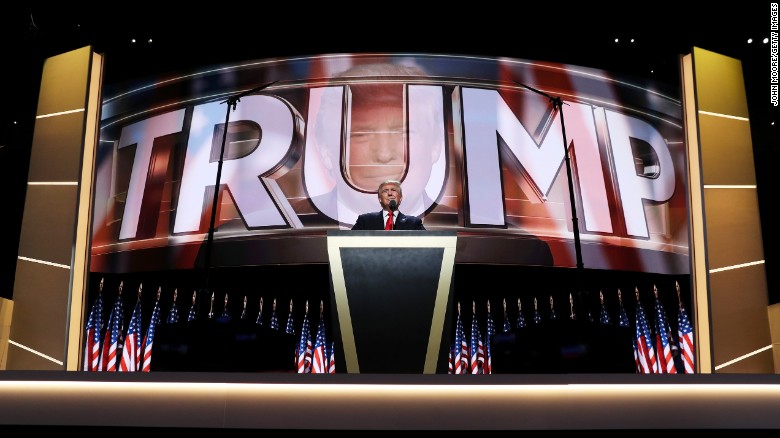
Donald Trump accepts the Republican Party’s nomination for president on Thursday, July 21, 2016 at the Republican National Convention in Cleveland. (Photo credit: John Moore / Getty Images)
By Stephen Collinson
![]()
July 22, 2016
Excerpts
Donald Trump conjured a dire picture Thursday of an America sliding deeper into poverty, violence and corruption and declared himself the only person who could avert disaster.
Accepting the Republican nomination in Cleveland, the billionaire twice pledged to be a “voice” for working Americans, restore law and order and to confound elites and doubters by winning the White House in November. …
Trump, whose unpredictable campaign has broken every rule of politics, portrayed America as a broken nation that only he can fix. …
Trump’s lengthy address — clocking in at one hour and 15 minutes — was the most crucial moment yet in his transformation from a brash tycoon and reality star with a sometimes vulgar tongue to a politician on the cusp of the presidency with an expansive vision of disruptive change. …
Donald Trump’s speech at the Republican convention, as prepared for delivery
——————
7/23/2016
Donald Trump is a Unique Threat to American Democracy
Donald Trump addressed the GOP convention in Cleveland, Ohio, July 21, 2016. The Republican presidential candidate spoke for more than one hour; we broke it down to less than five minutes. (Deirdra O’Regan / The Washington Post)
By Editorial Board
![]()
July 22, 2016
Excerpts
DONALD J. TRUMP, until now a Republican problem, this week became a challenge the nation must confront and overcome. The real estate tycoon is uniquely unqualified to serve as president, in experience and temperament. He is mounting a campaign of snarl and sneer, not substance. To the extent he has views, they are wrong in their diagnosis of America’s problems and dangerous in their proposed solutions. Mr. Trump’s politics of denigration and division could strain the bonds that have held a diverse nation together. His contempt for constitutional norms might reveal the nation’s two-century-old experiment in checks and balances to be more fragile than we knew.
Any one of these characteristics would be disqualifying; together, they make Mr. Trump a peril. We recognize that this is not the usual moment to make such a statement. In an ordinary election year, we would acknowledge the Republican nominee, move on to the Democratic convention and spend the following months, like other voters, evaluating the candidates’ performance in debates, on the stump and in position papers. This year we will follow the campaign as always, offering honest views on all the candidates. But we cannot salute the Republican nominee or pretend that we might endorse him this fall. A Trump presidency would be dangerous for the nation and the world.
Why are we so sure? Start with experience. It has been 64 years since a major party nominated anyone for president who did not have electoral experience. …
The lack of experience might be overcome if Mr. Trump saw it as a handicap worth overcoming. But he displays no curiosity, reads no books and appears to believe he needs no advice. In fact, what makes Mr. Trump so unusual is his combination of extreme neediness and unbridled arrogance. He is desperate for affirmation but contemptuous of other views. …
Given his ignorance, it is perhaps not surprising that Mr. Trump offers no coherence when it comes to policy. …
Most alarming is Mr. Trump’s contempt for the Constitution and the unwritten democratic norms upon which our system depends. He doesn’t know what is in the nation’s founding document. …
Worse, he doesn’t seem to care about its limitations on executive power. …
Mr. Trump is a unique and present danger.
Full editorial at the Washington Post
——————
7/27/2016
Counterpoint/Perspective
The True Story: Donald Trump Did Not Mock a Reporter’s Disability

By Catholics 4 Trump
July 27, 2016
At the Democratic National Convention speakers are repeating the claim, amplified ad nauseam by the left and establishment GOP opponents over the past year, that Donald Trump mocked the disability of New York Times reporter, Serge Kovaleski. This accusation has served as a very convenient tool to both smear Trump’s character and to avoid having to confront him on substantive political issues. But is it true? Here is the story the media is not telling you. …
——————
9/30/2016
Why Donald Trump can’t let go of Alicia Machado
Four days after the debate, why can’t Donald Trump let go of the decades-old former Miss Universe, Alicia Machado, imbroglio — especially when it can only hurt him with the key suburban women demographic?
Short answer: Narcissistic leaders display grandiosity, are vulnerable to criticism, and lack empathy. In response to personal slights, they are prone to lash out vindictively against their critics and blame others for their own failures (see “Why tyrants go too far: Malignant narcissism and absolute power” by political scientist Betty Glad in Political Psychology, vol. 23, no. 1 [March 2002], pp. 1-37).
![]() Video » Trump goes on a Friday tweet storm (MSNBC “Morning Joe,†Sept. 30, 2016) — Up early, Donald Trump took to Twitter on Friday to rail against both Hillary Clinton and Alicia Machado. (14:11)
Video » Trump goes on a Friday tweet storm (MSNBC “Morning Joe,†Sept. 30, 2016) — Up early, Donald Trump took to Twitter on Friday to rail against both Hillary Clinton and Alicia Machado. (14:11)
![]() Video » Mika: Trump telling women he determines beauty (MSNBC “Morning Joe,†Sept. 30, 2016) — Mika Brzezinski weighs in on this week’s controversy involving former Miss Universe Alicia Machado and Donald Trump’s remarks about her weight. (5:15)
Video » Mika: Trump telling women he determines beauty (MSNBC “Morning Joe,†Sept. 30, 2016) — Mika Brzezinski weighs in on this week’s controversy involving former Miss Universe Alicia Machado and Donald Trump’s remarks about her weight. (5:15)
———————
11/27/2016
A Question of Temperament: Donald Trump’s Fitness to Lead
——————
4/28/2018
Students Present Research at Scholarship Day
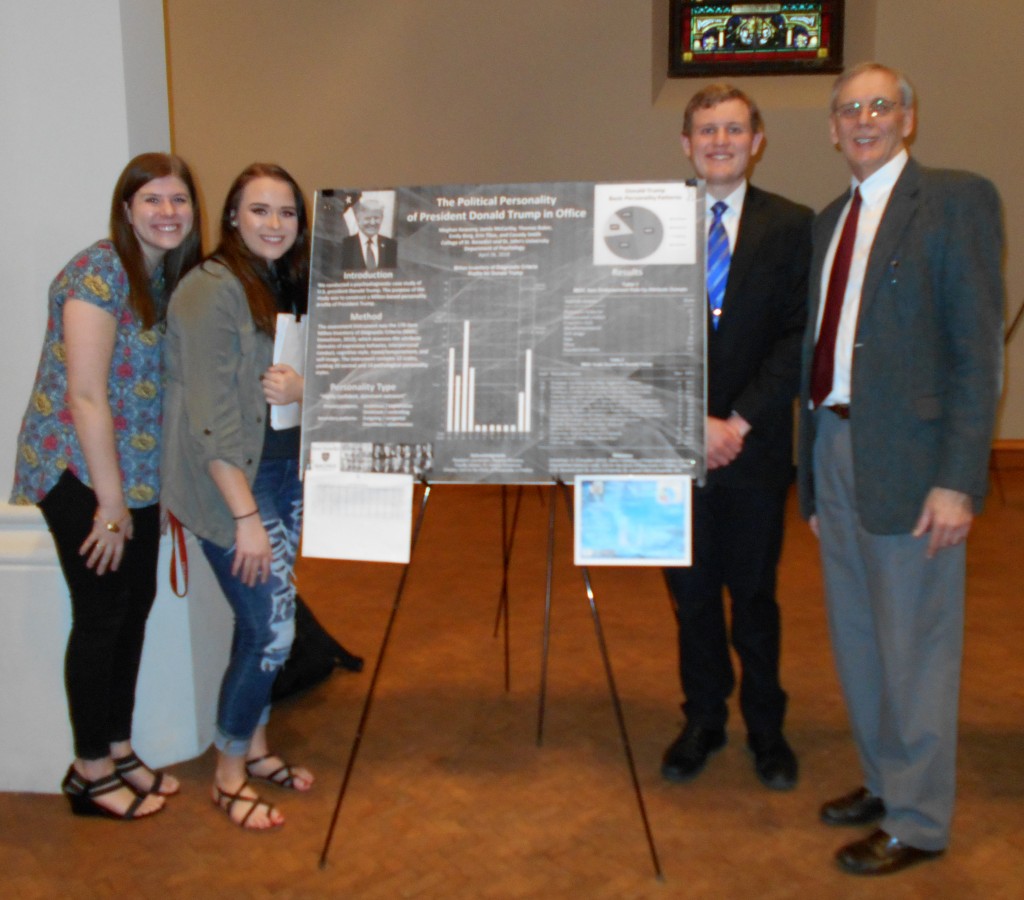
Emily Berg, Cassidy Smith, and Thomas Baker (pictured with faculty research moderator Dr. Aubrey Immelman) presented their research project, “The Political Personality of President Donald Trump in Office,†at the 18th annual Celebrating Scholarship & Creativity Day, April 26, 2018, in the Great Hall at St. John’s University in Collegeville, Minnesota.
COLLEGEVILLE, Minn. (April. 27, 2018) — Psychological profiles of U.S. President Donald Trump and North Korean Supreme Leader Kim Jong-un were presented on April 26, 2018, at “Celebrating Scholarship and Creativity Day,†an annual event to recognize students, faculty, and staff who have undertaken significant research, scholarship, or creative works during the past academic year at St. John’s University and the College of St. Benedict.
Undergraduate students in a Personality Psychology course at the colleges conducted the research under the auspices of the Unit for the Study of Personality in Politics, directed by Aubrey Immelman, Ph.D., associate professor of psychology.
Biographical and life history data concerning the candidates were collected from media reports and synthesized into personality profiles using the third edition of the Millon Inventory of Diagnostic Criteria (MIDC), which yields 34 normal and maladaptive personality classifications congruent with DSM–III–R, DSM–IV, and DSM–5.
——————————————————————
The Political Personality
of President Donald Trump in Office
Meghan Keaveny, Jamie McCarthy, Thomas Baker, Emily Berg, Erin Titus, Cassidy Smith, and Aubrey Immelman
Unit for the Study of Personality in Politics
April 26, 2018
Abstract
A remote psychological assessment of Donald Trump in his capacity as president of the United States was conducted in spring 2018. Psychodiagnostically relevant data regarding Trump was collected from biographical sources and media reports published after his inauguration as president on January 20, 2017, and synthesized into a personality profile using the Millon Inventory of Diagnostic Criteria (MIDC), which yields 34 normal and maladaptive personality classifications congruent with DSM–III–R, DSM–IV, and DSM–5. The primary purpose of this study, which will continue throughout the Trump presidency, was to compare Trump’s public personality in office to his personality prior to assuming political office, as assessed during the 2016 presidential election cycle.
The personality profile yielded by the MIDC was analyzed in accordance with interpretive guidelines provided in the MIDC and Millon Index of Personality Styles manuals. Trump’s primary personality patterns were found to be Ambitious/exploitative and Dominant/controlling, infused with secondary Outgoing/congenial and Dauntless/adventurous features, possibly supplemented by a slight Erratic/unstable tendency.
In summary, Trump can be characterized as a highly confident, dominant extravert, based on the amalgam of Ambitious, Dominant, and Outgoing patterns in his overall personality profile.
Ambitious individuals are bold, competitive, and self-assured; they easily assume leadership roles, expect others to recognize their special qualities, and often act as though entitled. Dominant individuals enjoy the power to direct others and to evoke obedience and respect; they are tough and unsentimental and often make effective leaders. Outgoing individuals are dramatic attention‑getters who thrive on being the center of social events, go out of their way to be popular with others, have confidence in their social abilities, tend to be impulsive and undisciplined, and become easily bored — especially when faced with repetitive or mundane tasks. Dauntless individuals tend to flout tradition, dislike following routine, sometimes act impulsively and irresponsibly, and are inclined to elaborate on or shade the truth and skirt the law.
Trump’s major personality strengths in a political role are his confident assertiveness, personal charisma, and persuasiveness. His major personality-based shortcomings are of a temperamental nature: impulsiveness and a lack of emotional restraint and self-discipline.
Alternate link to “The Personality Profile of 2016 Republican Presidential Candidate Donald Trump” at Unit for the Study of Personality in Politics website » http://Personality-Politics.org/Donald-Trump
Leave a Reply
You must be logged in to post a comment.

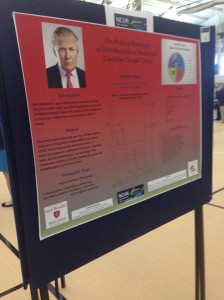



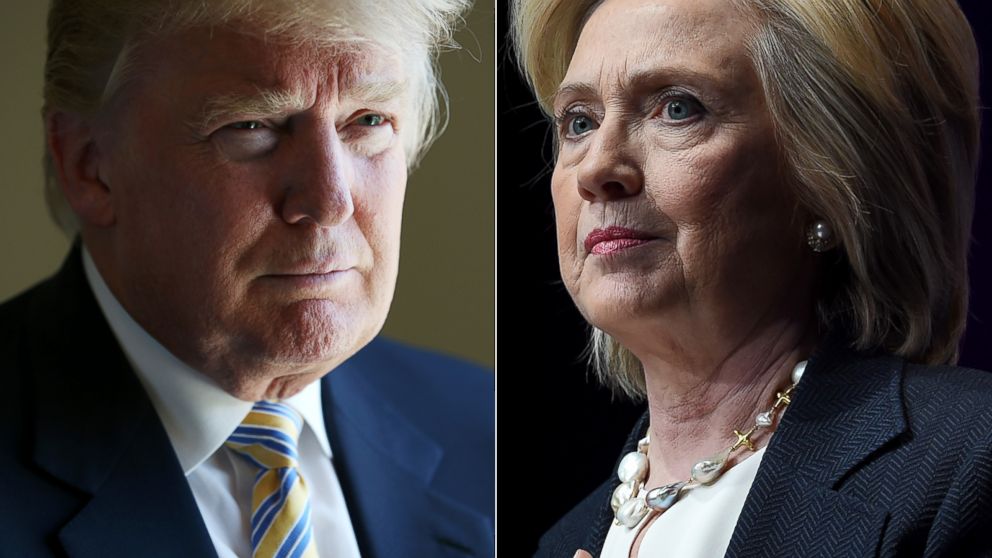
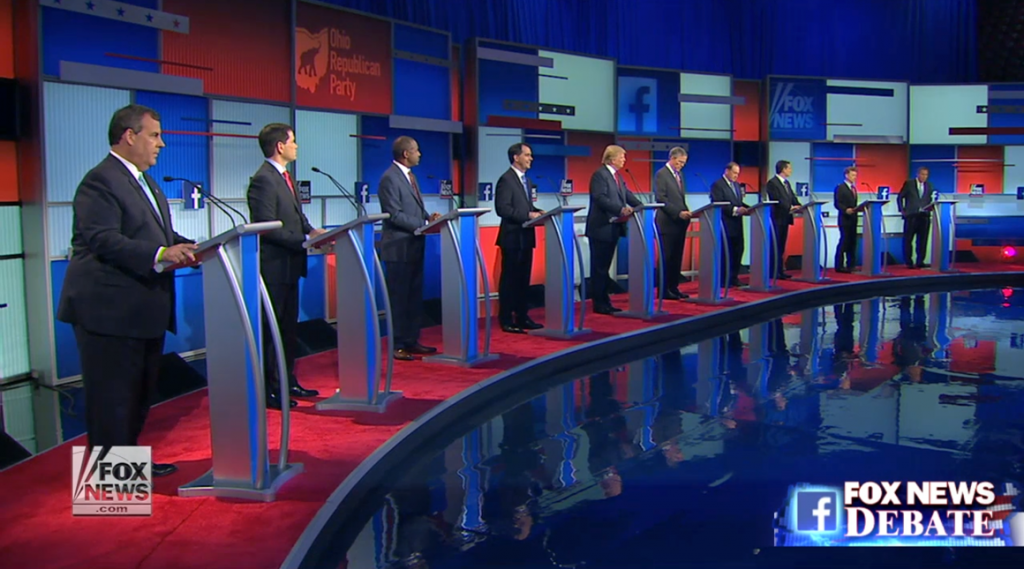
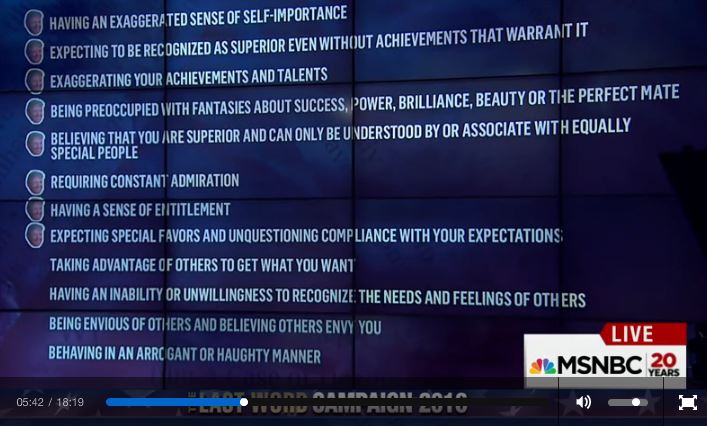





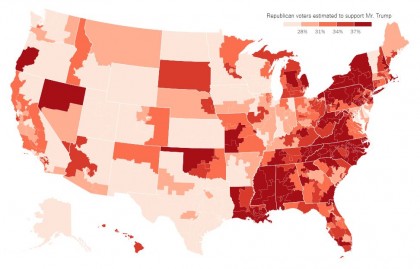
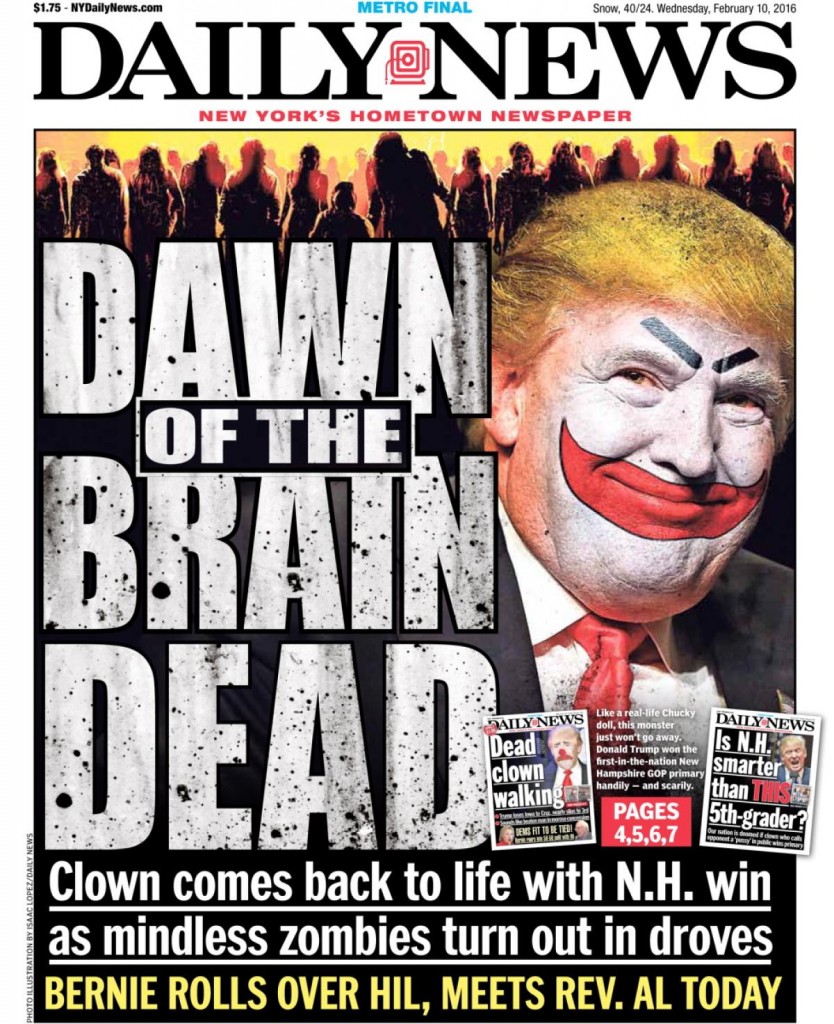

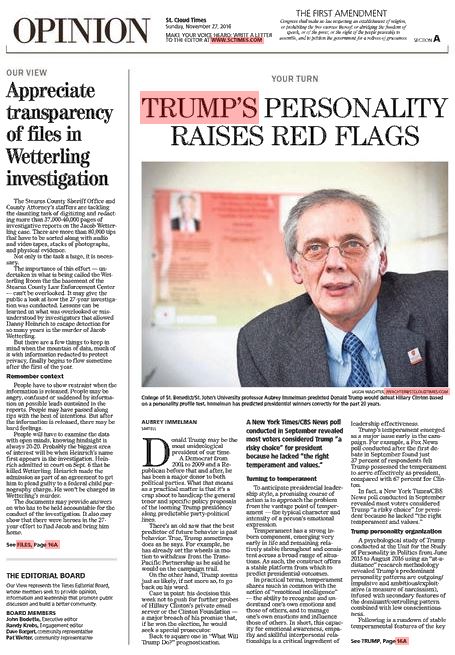
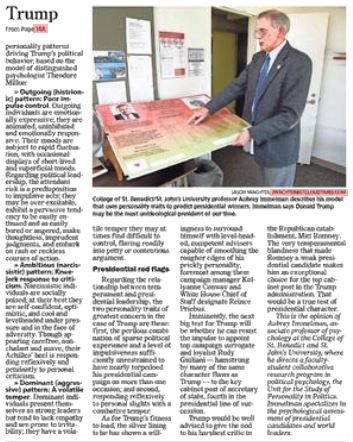
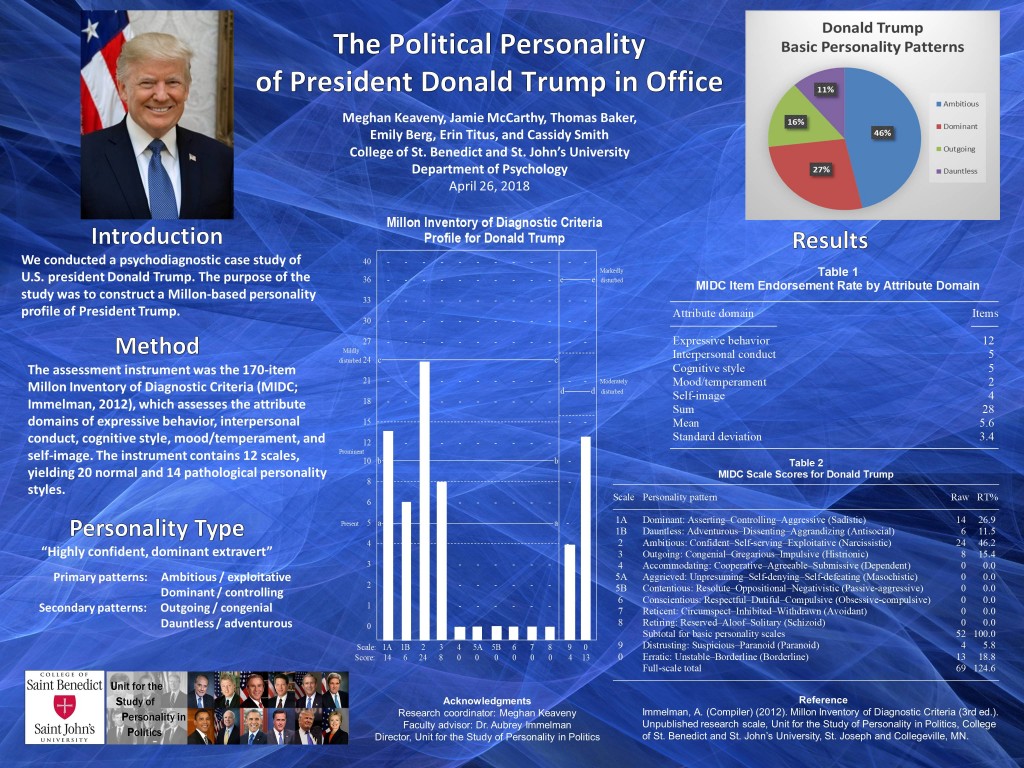

August 14th, 2015 at 9:10 am
[…] The Personality Profile of 2016 Republican Presidential Candidate Donald Trump (Aug. 9, 2015) […]
August 14th, 2015 at 11:42 am
[…] Donald Trump — in progress [Update: study completed August 2015] […]
August 16th, 2015 at 9:32 am
[…] The Personality Profile of 2016 Republican Presidential Candidate Donald Trump (Aug. 9, 2015) […]
August 22nd, 2015 at 5:38 pm
[…] The Personality Profile of 2016 Republican Presidential Candidate Donald Trump (Aug. 9, 2015) […]
August 23rd, 2015 at 6:31 am
[…] The Personality Profile of 2016 Republican Presidential Candidate Donald Trump (Aug. 9, 2015) […]
August 25th, 2015 at 10:48 pm
“All candidates for president have large egos, but Trump’s is so pure, so distilled that you could almost bottle it.” (Roger Simon, Politico, Aug. 25, 2015) » http://www.politico.com/story/2015/08/politics-2016-bring-in-the-clowns-121678.html
August 30th, 2015 at 9:55 am
[…] The Personality Profile of 2016 Republican Presidential Candidate Donald Trump (Aug. 9, 2015) […]
September 30th, 2015 at 8:02 am
[…] The Personality Profile of 2016 Republican Presidential Candidate Donald Trump […]
February 29th, 2016 at 8:37 pm
[…] The Personality Profile of 2016 Republican Presidential Candidate Donald Trump […]
March 24th, 2016 at 5:04 pm
[…] The Personality Profile of 2016 Republican Presidential Candidate Donald Trump […]
April 12th, 2016 at 10:48 am
Cross-posted from “‘Fascist’ finally seems like it applies” at http://www.sctimes.com/story/opinion/2016/04/12/fascist-finally-seems-like-applies/82803822/
From an ideological perspective, the label “Machiavellian” offers a more apt description of Donald Trump than “fascist.”
My reason for saying that is that — unlike, for example, Ted Cruz — Trump does not appear to have a coherent set of core values; he is essentially nonideological.
From the perspective of the psychology of politics, my own empirically based shorthand for Trump’s personality style is “high-dominance charismatic.”
More » http://www.immelman.us/news/the-personality-profile-of-2016-republican-presidential-candidate-donald-trump/
April 18th, 2016 at 9:01 pm
[…] The Personality Profile of 2016 Republican Presidential Candidate Donald Trump […]
April 19th, 2016 at 7:47 am
[…] The Personality Profile of 2016 Republican Presidential Candidate Donald Trump […]
April 19th, 2016 at 9:35 am
[…] The Personality Profile of 2016 Republican Presidential Candidate Donald Trump […]
May 2nd, 2016 at 2:04 am
[…] The Personality Profile of 2016 Republican Presidential Candidate Donald Trump […]
July 22nd, 2016 at 11:32 pm
“Trump brings together aggression [MIDC scale 1A] and narcissism [MIDC scale 2] with a kind of militant ignorance which can be harmless or even amusing in the make believe world of reality TV or New York real estate but becomes positively dangerous on a national and global stage, thrashing about like a hose spewing fire.”
Josh Marshall, “Making Sense of the Conflagration,” Talking Points Memo, July 21, 2016 » http://talkingpointsmemo.com/edblog/making-sense-of-the-conflagration
July 30th, 2016 at 2:15 pm
[…] The Personality Profile of 2016 Republican Presidential Candidate Donald Trump […]
August 10th, 2016 at 9:49 am
[…] The Personality Profile of 2016 Republican Presidential Candidate Donald Trump […]
August 11th, 2016 at 12:00 pm
[…] The Personality Profile of 2016 Republican Presidential Candidate Donald Trump […]
August 18th, 2016 at 9:47 pm
Cross-posted from https://www.psychologytoday.com/blog/the-situation-lab/201509/the-personality-donald-trump » Dr. Sherman’s evaluation has convergent validity; his evaluation is largely consistent with my own empirical analysis » http://personality-politics.org/donald-trump
Narcissism can be inferred from Highly Bold (“Mr. Trump’s most defining characteristic … unusually self-confident, and shows feelings of grandiosity and entitlement”) and, to a lesser extent, Highly Ambitious (“Mr. Trump seems competitive, wants to win”).
September 26th, 2016 at 2:45 am
[…] The Personality Profile of 2016 Republican Presidential Candidate Donald Trump […]
October 5th, 2016 at 9:48 am
[…] The Personality Profile of 2016 Republican Presidential Candidate Donald Trump […]
October 8th, 2016 at 7:01 pm
[…] The Personality Profile of 2016 Republican Presidential Candidate Donald Trump […]
November 3rd, 2016 at 2:43 am
[…] The Personality Profile of 2016 Republican Presidential Candidate Donald Trump […]
November 8th, 2016 at 11:11 am
[…] The Personality Profile of 2016 Republican Presidential Candidate Donald Trump […]
November 13th, 2016 at 9:48 am
Cross-posted from “If you voted for Trump because he’s ‘anti-establishment,’ guess what: You got conned” (Paul Waldman, ‘The Plum Line,’ Washington Post, Nov. 11, 2016) » https://www.washingtonpost.com/blogs/plum-line/wp/2016/11/11/if-you-voted-for-trump-because-hes-anti-establishment-guess-what-you-got-conned/
From the article” “Trump is … reckless, impulsive, vindictive, hateful, and authoritarian, and his presidency is going to be somewhere between disastrous and cataclysmic, likely in ways we can’t even imagine yet.”
Here’s a comprehensive psychological assessment of Donald Trump’s political personality, issued by the Unit for the Study of Personality in Politics:
“The Political Personality of 2016 Republican Presidential Nominee Donald J. Trump†(31 pp.) » http://digitalcommons.csbsju.edu/psychology_pubs/103/
December 4th, 2016 at 10:11 am
[…] The Personality Profile of 2016 Republican Presidential Candidate Donald Trump […]
December 19th, 2016 at 5:56 am
[…] The Personality Profile of 2016 Republican Presidential Candidate Donald Trump (Aug. 9, 2015) […]
December 27th, 2016 at 8:44 am
[…] The Personality Profile of 2016 Republican Presidential Candidate Donald Trump […]
January 23rd, 2017 at 6:11 am
[…] The Personality Profile of 2016 Republican Presidential Candidate Donald Trump […]
January 26th, 2017 at 5:45 am
Cross-posted from “Is Trump Demented?” at http://www.poliscirumors.com/topic/is-trump-demented/page/2?replies=30#post-681408
This is to clarify confusion between the Million Clinical Multiaxial Inventory (MCMI-III) and my own unpublished political psychology research scale, the Millon Inventory of Diagnostic Criteria (MIDC), which I developed in collaboration with Theodore Millon.
Specifically, it is noted that “Base Rate scores … of 75-84 are taken to indicate a significant personality trait or mental health concern” and “Scores 85 and higher indicate a persistent, significant clinical concern or personality disorder.” Those criteria pertain specifically to the MCMI-III.
On the MIDC, a scale score above 10 suggests the personality pattern in question is “prominent” and a score of 24 or higher (i.e., both Donald Trump and Hillary Clinton on the Ambition/narcissism scale 2) is indicative of a possible personality disorder). A score as low as 15 indicates a potential for personality dysfunction in some attribute domains.
Aubrey Immelman
Unit for the Study of Personality in Politics
http://www.personality-politics.org
February 8th, 2017 at 7:54 am
Furor on video of students chanting ‘Build That Wall’ (Inside Higher Ed, Feb. 8, 2017) » https://www.insidehighered.com/quicktakes/2017/02/08/furor-video-students-chanting-build-wall
Video » https://m.facebook.com/story.php?story_fbid=10206196978762129&id=1794227439
February 17th, 2017 at 7:56 am
‘Crazy like a fox’: Mental health experts try to get inside Trump’s mind (Sharon Begley, STAT, Jan. 30, 2017) » https://www.bostonglobe.com/metro/2017/02/12/analyzing-president-from-afar/dXrPZlHwBA26icBVgzwojJ/story.html » https://www.statnews.com/2017/01/30/trump-mental-health/comment-page-14/#comment-181977
February 20th, 2017 at 6:12 am
From “A psychological evaluation of Donald Trump, Hillary Clinton, Jill Stein, and Bernie Sanders – and their followers” (by Gary Kohls, Global Research, Nov. 1, 2016) » http://www.globalresearch.ca/a-psychological-evaluation-of-donald-trump-hillary-clinton-jill-stein-and-bernie-sanders-and-their-followers/5554237
A megalomaniac is a pathological egotist, someone with a psychological disorder who exhibits symptoms like delusions of grandeur and an obsession with greatness, power or wealth.
A sociopath is a person whose behavior is antisocial, often criminally greedy, and who lacks a sense of moral responsibility, empathy or social conscience. Sociopaths never sincerely apologize nor are they capable of exhibiting remorse for wrongs that they have committed.
A narcissist is person who has an inflated sense of their own importance, a deep need for admiration, sexual gratification, applause and a lack of empathy for others.
A paranoid person or group exhibits excessive or irrational suspiciousness and distrustfulness of other individuals or groups.
A xenophobe is a person who is fearful or contemptuous of that which is foreign, especially of strangers or of people from different countries or cultures.
A demagogue is a political leader who seeks support by appealing to popular desires and prejudices rather than by using rational argument.
February 20th, 2017 at 9:53 am
[…] The Personality Profile of 2016 Republican Presidential Candidate Donald Trump (Aug. 9, 2015) […]
March 10th, 2017 at 10:35 am
From “‘Protect Us from This Dangerous President,’ 2 Psychiatrists Say” (Letter to the Editor, New York Times, March 9, 2017) » https://www.nytimes.com/2017/03/08/opinion/protect-us-from-this-dangerous-president-2-psychiatrists-say.html
To the Editor:
Soon after the election, one of us raised concerns about Donald Trump’s fitness for office, based on the alarming symptoms of mental instability he had shown during his campaign. Since then, this concern has grown. Even within the space of a few weeks, the demands of the presidency have magnified his erratic patterns of behavior.
In particular, we are struck by his repeated failure to distinguish between reality and fantasy, and his outbursts of rage when his fantasies are contradicted. Without any demonstrable evidence, he repeatedly resorts to paranoid claims of conspiracy.
Most recently, in response to suggestions of contact between his campaign and agents of the Russian government, he has issued tirades against the press as an “enemy of the people†and accusations without proof that his predecessor, former President Barack Obama, engaged in partisan surveillance against him.
We are in no way offering a psychiatric diagnosis, which would be unwise to attempt from a distance. Nevertheless, as psychiatrists we feel obliged to express our alarm. We fear that when faced with a crisis, President Trump will lack the judgment to respond rationally.
The military powers entrusted to him endanger us all. We urge our elected representatives to take the necessary steps to protect us from this dangerous president.
Judith L. Herman
Robert Jay Lifton
NEW YORK
Dr. Herman is a professor of psychiatry at Harvard Medical School. Dr. Lifton is a lecturer in psychiatry at Columbia University and professor emeritus at CUNY.
March 11th, 2017 at 9:16 am
From “The Daily 202: Wiretapping allegations accomplished what Trump wanted – but may backfire bigly” (James Hohmann, Washington Post, March 6, 2017) » https://www.washingtonpost.com/news/powerpost/paloma/daily-202/2017/03/06/daily-202-wiretapping-allegations-accomplished-what-trump-wanted-but-may-backfire-bigly/58bca8bde9b69b1406c75d42/
Excerpts:
It is past time to dispense with the fiction that Trump doesn’t know what he’s doing. He knows exactly what he’s doing. He is trying to distract us. …
THIS IS TRUMP’S MODUS OPERANDI:
— Whenever he is under fire for something in a sustained way, he makes a shocking claim or provocative declaration about something else to change the subject. He is a master practitioner at the politics of distraction. These five examples might jog your memory:
» After struggling during the first GOP primary debate to explain his disparaging comments about women, he attacked Megyn Kelly. “There was … blood coming out of her wherever,†he said, ensuring that the media focused on the new Trump-Kelly “feud.â€
» When the 2005 Access Hollywood video came out, he brought Bill Clinton’s former accusers to St. Louis as his guests to the second debate.
» In November, the morning after agreeing to settle a fraud lawsuit against Trump University for $25 million, he demanded that the cast of “Hamilton†apologize to Mike Pence.
» Days after firing Michael Flynn, he held a rambling 77-minute press conference because he knew that it would get the Flynn story out of the news.
» Perturbed when critics pointed out that he lost the popular vote, he claimed that 3 million to 5 million people voted illegally.
ALWAYS ATTACK, NEVER APOLOGIZE
— Trump’s approach to crisis management continues to be guided by the Roy Cohn playbook. “This is McCarthyism!†Trump said, as he attacked Obama for supposedly wiretapping him, on Saturday. There was great irony to this. Cohn, after all, was Joe McCarthy’s chief counsel on the Senate Permanent Subcommittee on Investigations during the early 1950s. Two decades later, he became one of Trump’s biggest mentors during a formative phase of his life.
— Cohn’s creed was to always be on the attack, to counterpunch whenever punched and to never apologize. Never, ever, ever apologize. He believed that you never yield an inch, even if you’re in the wrong, because your opponents will take a mile. …
April 28th, 2017 at 12:17 am
[…] The Personality Profile of 2016 Republican Presidential Candidate Donald Trump (Aug. 9, 2015) […]
June 1st, 2017 at 11:35 pm
From “When the World Is Led by a Child” (David Brooks, New York Times, May 15, 2017) » https://www.nytimes.com/2017/05/15/opinion/trump-classified-data.html
Excerpts:
At base, Trump is an infantalist. There are three tasks that most mature adults have sort of figured out by the time they hit 25. Trump has mastered none of them. Immaturity is becoming the dominant note of his presidency, lack of self-control his leitmotif. …
His inability to focus his attention makes it hard for him to learn and master facts. …
Trump seems to need perpetual outside approval to stabilize his sense of self, so he is perpetually desperate for approval, telling heroic fabulist tales about himself. …
Which brings us to the reports that Trump betrayed an intelligence source and leaked secrets to his Russian visitors. From all we know so far, Trump didn’t do it because he is a Russian agent, or for any malevolent intent. He did it because he is sloppy, because he lacks all impulse control, and above all because he is a 7-year-old boy desperate for the approval of those he admires. …
We’ve got this perverse situation in which the vast analytic powers of the entire world are being spent trying to understand a guy whose thoughts are often just six fireflies beeping randomly in a jar. …
April 27th, 2018 at 12:02 pm
[…] The Personality Profile of 2016 Republican Presidential Candidate Donald Trump (Aug. 9, 2015) […]
July 15th, 2018 at 1:59 pm
[…] The Personality Profile of 2016 Republican Presidential Candidate Donald Trump (Aug. 9, 2015) […]
May 6th, 2019 at 12:01 am
[…] Donald Trump […]
July 1st, 2019 at 8:04 pm
[…] When Immelman and his research assistants first met in June 2015 to decide which candidates to profile, they picked five Republicans they thought were the most viable, including Jeb Bush, Ted Cruz, and Marco Rubio. On a whim, Immelman suggested including the New York real estate mogul whose presidential bid seemed like a long shot. “I said, ‘Hey, why don’t we do Trump?’ †Immelman recalled. “We all laughed. I laughed the hardest.†[…]